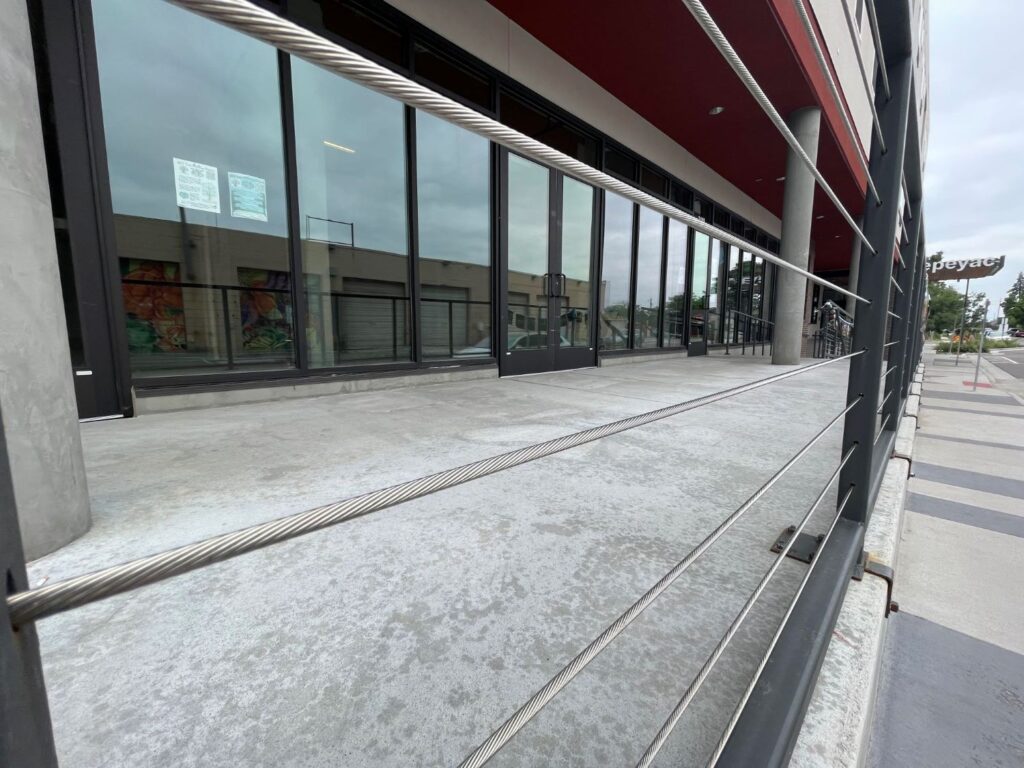By Celeste Benzschawel
The opening of a grocery store at the Viña Apartments complex has been delayed until at least 2024. Earlier this spring at an East Denver Food Sovereignty Initiative (EDFSI) steering committee meeting, a new goal of August was set for its launch.
But since then, there have been changes in staff and vision for the project. In April, Flor Marquez, an independent consultant for equitable community development, joined the project as project manager. She was part of the early conversations about a food cooperative during the pandemic, but she stepped away for maternity leave.
When she returned to the project this year, an additional community-based steering committee was brought on. Previous leadership consisted mostly of organizations, Marquez said, and they’ve since shifted to a more community-led approach with perspectives from people who live in the area.
One of the initial key players involved in the project was Roberto Meza, co-founder of Emerald Gardens, and co-founder and CEO of East Denver Food Hub. He was one of the people who helped write the grant that enabled the project to sustain a five-year lease on the space. Meza was also the one to secure the lease.
“My main motivation was to bring resources and connections, and to protect the infrastructure from further development and potential gentrification,” Meza said. “I really kind of put myself on the line, and my company, East Denver Food Hub, as a main guarantor of the lease, which is a very risky maneuver, but I really felt compelled to, again, be a steward of the infrastructure and protect it.”

Meza didn’t see East Denver Food Hub as being a main decision-maker, but rather to use its social and economic capital to protect the space, he said. What he wasn’t clear on was who would manage the lease for its duration.
When the grant was awarded, it went to the Center For Community Wealth Building as its fiscal sponsor and financial overseer. That became concerning for Meza as the person responsible for the rent. But the steering committee is currently looking at what a transfer of the lease to the Center For Community Wealth Building will look like.
Meza took a step back from the project to focus on the supply chain and how East Denver Food Hub could leverage its network and infrastructure to support the flow of food into the community now, he said. That, after all, was his main motivator to begin with. It was during his absence that the second community-based steering committee was created. He said he began to feel tension at this time because he had already been paying rent for months and they had made little progress, and he was worried it would continue to take even longer.
“Still, the community has no more fresh food now than when we started the project,” Meza said. “It’s been a whole year, and I feel like there’s two parallel things: We need to make sure that they have the food that they need right now, and we can continue to move forward and develop the project and the grant.”
Now that Marquez has been positioned as the main point person, Meza has categorized himself as a partner of the project rather than as a core participant.
“Over the last few months, we’ve just been working really hard to build up the capacity of this steering committee and to kind of get everyone fully onboarded,” Marquez said.
She said the process has taken longer than many anticipated, but that most community-led projects tend to. At this time, the committee is poised to move the project forward. The group recently voted on the final design schematics for the interior of the building.
From there, they are hiring a general contractor, finalizing the blueprints and submitting for permits, Marquez said. She said she expects that it will be at least three months until they have the permits to begin work. During this wait time, the team will continue to develop components of the business plan, like hiring local community members, launching a new website, hosting events and introducing their new name.
“It’s exciting. I think having all of the community’s great ideas embedded into this is going to make it a truly community-owned grocery store as opposed to it being a corporation or another entity,” Marquez said. “It is definitely a slower process and a different approach, but I think a lot of people are learning lots of skills along the way.”
And by a community-owned store, Marquez really means community owned. In addition to sourcing food from local producers and creating jobs, “community owned” means people will actually buy into a membership and receive a dividend of the profits at the end of the year.
“I’m really excited to see how the community can feel empowered in this process,” Meza said, “Especially what they learn and what they take from the process and the grant, even after this project is concluded. I feel like I’ve definitely learned a lot in terms of how to balance empowering and supporting the community so that they make the decisions, and at the same time bringing the resources, the tools and the capacity to continue moving the project forward. And also, how we work together as for-profits, nonprofits and using grants to support social enterprises. It’s been a really instructive process.”

Be the first to comment